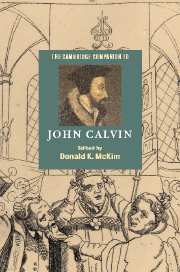17 - Calvin in ecumenical context
from Part IV - Calvin Today
Published online by Cambridge University Press: 28 May 2006
Summary
John Calvin can be seen in an ecumenical context from the sixteenth century right into the twenty-first century. He had a broad and catholic understanding of the one church of Jesus Christ, an outreaching pastoral relationship to churches all over Europe that encouraged greater unity among them, and a passionate concern to make the worldwide reign of Christ visible. Many heirs to his thought have been active leaders and participants in the modern ecumenical movement, believing that Calvin's theology supported their work.
This chapter will identify elements of Calvin's own thought and work which laid a foundation for ecumenical work, selecting them from the broad outlines of Calvin's theology and its history surveyed in earlier chapters. Then it will suggest a few of the ways in which Calvin's influence remains visible in the modern ecumenical movement and in the worldwide church today.
First, however, a definition of “ecumenism” as it will be used here is in order. In a general sense, ecumenism has been understood as a movement in search of Christian unity, inspired by the Holy Spirit. Evidence of such a movement can be found in many periods of church history, including the sixteenth-century Reformation.
- Type
- Chapter
- Information
- The Cambridge Companion to John Calvin , pp. 305 - 316Publisher: Cambridge University PressPrint publication year: 2004

